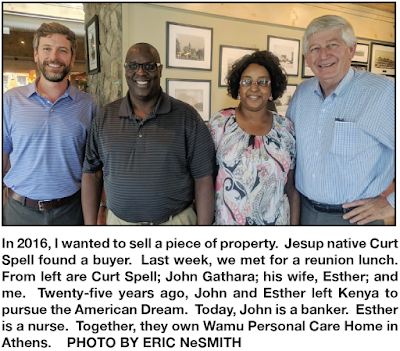We were strangers. Our hometowns are on different sides of the
globe. But within minutes, the
8,000-mile expanse shrank to just a few feet away—across a walnut conference
table. Our thoughts were even closer.
John
grew up in Karatina, Kenya, in the foothills of Mount Kenya, the second-tallest
mountain in Africa. He’s a banker. His wife, Esther, is a nurse. A quarter-century ago, they came to the United
States to chase the American Dream.
How
did we meet?
As
with so many other things, there’s a Jesup connection. In the 1980s, Curt Spell’s family lived
across the street from us. Today, he’s
an ace among Athens real estate agents.
I had something to sell. That’s
how John, Esther and I connected at a real estate closing in early 2016.
 As
we were exchanging pleasantries, Curt asked, “How’s it going with the coal-ash situation back home?”
John listened. And then he began
to tell a pollution horror story. He had
witnessed the destruction of the fishing industry along the eastern African
coast, especially in neighboring Somalia.
As
we were exchanging pleasantries, Curt asked, “How’s it going with the coal-ash situation back home?”
John listened. And then he began
to tell a pollution horror story. He had
witnessed the destruction of the fishing industry along the eastern African
coast, especially in neighboring Somalia.
Horrible
toxic and hazardous wastes had been dumped into the Indian Ocean. Fish, the country’s cash crop, were poisoned and
died. Besides the environmental harm, Somalia’s
economic structure was devastated, too. A
culture of crime and piracy evolved to fill the void.
John
explained how environmental degradation was a constant threat to the people of
Africa. The lack of an environmental
consciousness turned once-forest-filled areas into deserts. In a recent visit, he introduced me to the
history of Wangari Maathai, who started as a one-woman crusade to reforest
Africa. The government’s tree experts
laughed at her when she challenged village women to join her Green Belt
Movement.
Research
Wangari Maathai. Since 1977, the women
have done what the naysayers said was impossible. An estimated 30 million new trees are growing
in Africa. Along the way, Maathai was
awarded the Nobel Peace Prize. But the
most important “prize” was the shifting of attitudes toward more responsible
stewardship of natural resources.
Last
Friday, I invited John, Esther, Curt and our son Eric to lunch. John was eager for an update on Wayne
County’s toxic coal-ash issue. I was
pleased to report that no additional coal ash has been dumped into the
Broadhurst Environmental Landfill. But
best of all, there’s a productive dialogue going on between Republic and the
community. As the saying goes: “Where’s there’s a will, there’s a
way.”
On
the following day, Saturday, I met Dale.
He’s a jeweler who goes to Africa in search of diamonds. Dale, too, had been following our coal-ash
story. He explained that he isn’t a
“conservationist,” but he is appalled at some of the things going on with the
environment.
On
one of his buying trips, he was staying in a “fancy” hotel on the coast of West
Africa. Poverty was obvious. Natives came to the volcanic reefs along the
shoreline to catch fish that got trapped when the tide receded. Fish are
a mainstay in local diets. Grimacing, Dale
said the hotel—100 yards down the beach—was dumping its raw sewage into the ocean.
That
took me back to what John said the day before, “When you dump things into the
ocean, you don’t know where the waves will take it.” I say the same thing about our wetlands,
aquifers and streams which lead to the Atlantic.
Wayne County is
not alone.
Environmental
degradation is a global challenge.
That’s why even
strangers share our concerns.
dnesmith@cninewspapers.com

